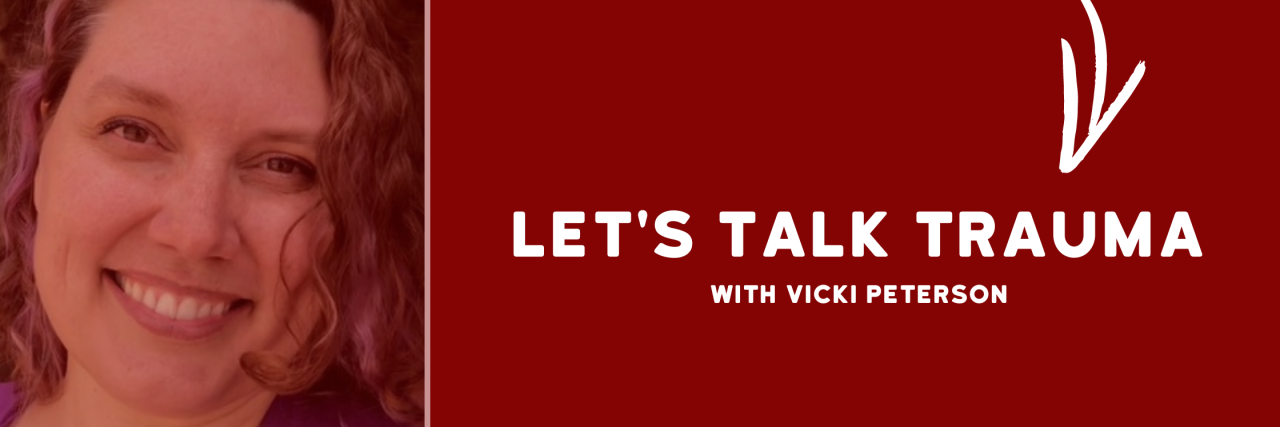Let's Talk Trauma: 'How Do I Heal Decades of Trauma?'
Editor's Note
Follow Vicki’s weekly trauma column “Let’s Talk Trauma” by following her on The Mighty!
Dear Vicki,
How do you heal decades of trauma? I am 44 and cannot find a therapist that is actually beneficial. ‘Finding a Friend’ is about the worst advice I was recently given. I am diligent and want to heal. Can you help me find a real therapist that deals with C-PTSD and knows what they are doing and not just claims to know how to help? Please!
Dear Fleurdelis,
Like you, I was in my 40s when I found the right therapist to help me do the deep dive into trauma recovery. I too was offered bad advice to “find a friend,” but none of my friends (even some who were therapists) were equipped to walk with me through shadows as deep and dark as complex post traumatic stress disorder (C-PTSD). I too was diligent and wanted to heal. My physical health had taken such a big hit from decades of emotional and psychological stress that I felt I had no other choice. I couldn’t work full time. I lived in a state of constant exhaustion. When I finally found the right therapist after decades of attempts, my therapy was not covered by insurance, and the financial strain was immense. I started eye movement desensitization and reprocessing (EMDR) therapy which cracked me wide open, and I was emotionally dysregulated for much of the week while I processed. Then I’d go back the next week and do it again. The trauma recovery process took everything I had and challenged every facet of my life. That said, I consider myself fortunate, because I eventually found resources which helped. In fact, they saved my life.
I still consider myself in recovery from trauma, and I likely will be for life. It’s still easy for me to feel exhausted and overwhelmed. The difference now is that I know how to listen to my body and brain to give it what it needs. I know my triggers. I’ve rearranged my life to only include the people, places and situations that keep me in a state of health and help me thrive. Most of the time, I can maintain emotional regulation. I access support systems and online communities of people who understand, even when loved ones in my immediate circles don’t. Most of all, I see the effects of years of non-linear progress adding up to a healthy lifestyle that I like and choose.
Trauma recovery must be individually tailored to your unique and specific needs. The bad news is that it takes a lot of trial and error to find out what that is. The good news is that when you find it, it works. Even though it can be frustrating, the process of finding and claiming what works for you can also be immensely healing, especially if you were previously denied the opportunity to develop your own identity and interests. Trauma-informed therapy is often a cornerstone of trauma recovery, but there are a lot of techniques, treatments and practices which may be better for you than others. In addition to therapy, there are books, online resources, exercises, retreats, arts-based practices and spiritual practices, to name a few. In addition to therapy, people who live with C-PTSD also might be juggling doctors and medications for the physical complications of stress, from managing migraines, auto-immune diseases, nightmares, clenched jaws, body armoring, gastro-intestinal issues, anxiety and depression, to name a few. As hard as it is to find the right therapist, I’ve personally found it to be even more difficult to find a general doctor who understands C-PTSD.
Figuring out the right care plan can be daunting, especially when our medical systems are not well suited for people who live with C-PTSD, but there are some resources to help you get started. A trauma recovery coach usually works in tandem with a therapist to help recommend and tailor a care plan to your specific needs. Coaches at the International Association of Trauma Recovery Coaching specialize in various types of trauma and offer a variety of individual, group and online services. The C-PTSD Foundation is also an excellent resource for support and services that might suit your needs. Therapists who are connected to or recommended by these organizations are a good bet. Dr. Arielle Schwartz (author of The C-PTSD Workbook) and Dr. Ramani Durvasula both have great resources on YouTube and are personal favorites.
In addition to emotionally processing past events and releasing trauma that is stuck in the physical body, a big part of healing from C-PTSD is building an identity and self-esteem that reflects your true self. Try brainstorming a list. What sorts of things do you like and enjoy doing? What sorts of things have you always wanted to try? What are some things that matter to you? What makes you feel happy? What makes you feel relaxed? What makes you feel connected to others? The answers might point you in the direction of the kinds of things you need in your care plan. If you are not ready to discover and incorporate these things into your life, have patience with yourself. If you are feeling dysregulated or overwhelmed, start with your sense of safety. What do you need to feel safe? What is something you can do right now to help you feel more safe? What are some things you can do right now to treat yourself with more kindness, patience, and compassion? Try putting your awareness on these questions throughout the day and see what comes up for you.
Love,
Vicki
Lead image contributed by contributor

